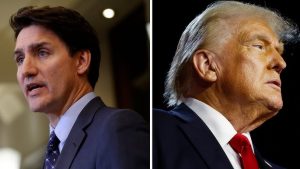Trump's remarks, alongside serious discussions about tariffs and trade, highlight the complex relationship between the U.S. and Canada, as both countries navigate economic and security issues.
Trump Humorously Touts Canada Annexation Amid Trade Talks

Trump Humorously Touts Canada Annexation Amid Trade Talks
In a recent post on Truth Social, Donald Trump playfully suggested the U.S. might consider annexing Canada while addressing trade relations, igniting debates across borders.
Former President Donald Trump has reignited discussions surrounding U.S.-Canada trade relations through his signature blend of humor and political insight. In a recent post on Truth Social, he jokingly referred to Canadian Prime Minister Justin Trudeau as the “Governor of the Great State of Canada,” hinting that the U.S. should contemplate annexing Canada if its economy falters under America-first tariffs.
“It was a pleasure to have dinner the other night with Governor Justin Trudeau of the Great State of Canada,” Trump quipped. “I look forward to seeing the Governor again soon so that we may continue our in-depth talks on tariffs and trade, the results of which will be truly spectacular for all!”
Trump's lighthearted nickname comes amidst a backdrop of serious discussions about trade, sparked during Trudeau’s recent visit to Mar-a-Lago. There, Trump reiterated his stance on imposing tariffs unless tangible progress was made by Canada and Mexico to address the rising flows of illegal drugs and migrants into the U.S. Notably, while the southern border often dominates the conversation regarding drug smuggling, the Canadian border is also experiencing significant challenges. Last year alone, U.S. authorities seized over 43 pounds of fentanyl at the northern border, in stark contrast to the staggering 21,000 pounds confiscated at the southern border.
Canadian officials, however, have expressed discontent with being associated with Mexico in this context. They assert that Canada’s critical role in U.S. trade and energy security must be acknowledged. Trudeau labeled his meeting with Trump as “productive,” but cautioned that tariffs on Canadian imports could adversely affect American consumers.
“Trump got elected on a commitment to make life better and more affordable for Americans,” Trudeau remarked. “I think people south of the border are beginning to wake up to the real reality that tariffs on everything from Canada would make life a lot more expensive.”
Canada’s Ambassador to the U.S., Kristen Hillman, echoed these sentiments, emphasizing the unique dynamics at play in the trade relationship. “We are one-tenth the size of the United States, so a balanced trade deal would mean per capita we are buying 10 times more from the U.S. than they are buying from us,” she emphasized, elucidating the context necessary for understanding these discussions.
Hillman also highlighted Canada’s significance as a crucial energy partner, noting that the nation exported $170 billion in energy to the U.S. last year. Approximately 77% of Canadian exports are sent to the United States, demonstrating the tightly interwoven nature of the two economies.
Despite existing tensions surrounding tariffs and trade policy, Trump's playful demeanor kept discussions lively. In a follow-up post, he shared an AI-generated image of himself holding a Canadian flag with the caption, “Oh, Canada!” This post encapsulates Trump’s talent for combining levity with serious policy talks, leaving both Americans and Canadians to ponder the true ramifications of his comments.
“It was a pleasure to have dinner the other night with Governor Justin Trudeau of the Great State of Canada,” Trump quipped. “I look forward to seeing the Governor again soon so that we may continue our in-depth talks on tariffs and trade, the results of which will be truly spectacular for all!”
Trump's lighthearted nickname comes amidst a backdrop of serious discussions about trade, sparked during Trudeau’s recent visit to Mar-a-Lago. There, Trump reiterated his stance on imposing tariffs unless tangible progress was made by Canada and Mexico to address the rising flows of illegal drugs and migrants into the U.S. Notably, while the southern border often dominates the conversation regarding drug smuggling, the Canadian border is also experiencing significant challenges. Last year alone, U.S. authorities seized over 43 pounds of fentanyl at the northern border, in stark contrast to the staggering 21,000 pounds confiscated at the southern border.
Canadian officials, however, have expressed discontent with being associated with Mexico in this context. They assert that Canada’s critical role in U.S. trade and energy security must be acknowledged. Trudeau labeled his meeting with Trump as “productive,” but cautioned that tariffs on Canadian imports could adversely affect American consumers.
“Trump got elected on a commitment to make life better and more affordable for Americans,” Trudeau remarked. “I think people south of the border are beginning to wake up to the real reality that tariffs on everything from Canada would make life a lot more expensive.”
Canada’s Ambassador to the U.S., Kristen Hillman, echoed these sentiments, emphasizing the unique dynamics at play in the trade relationship. “We are one-tenth the size of the United States, so a balanced trade deal would mean per capita we are buying 10 times more from the U.S. than they are buying from us,” she emphasized, elucidating the context necessary for understanding these discussions.
Hillman also highlighted Canada’s significance as a crucial energy partner, noting that the nation exported $170 billion in energy to the U.S. last year. Approximately 77% of Canadian exports are sent to the United States, demonstrating the tightly interwoven nature of the two economies.
Despite existing tensions surrounding tariffs and trade policy, Trump's playful demeanor kept discussions lively. In a follow-up post, he shared an AI-generated image of himself holding a Canadian flag with the caption, “Oh, Canada!” This post encapsulates Trump’s talent for combining levity with serious policy talks, leaving both Americans and Canadians to ponder the true ramifications of his comments.



















